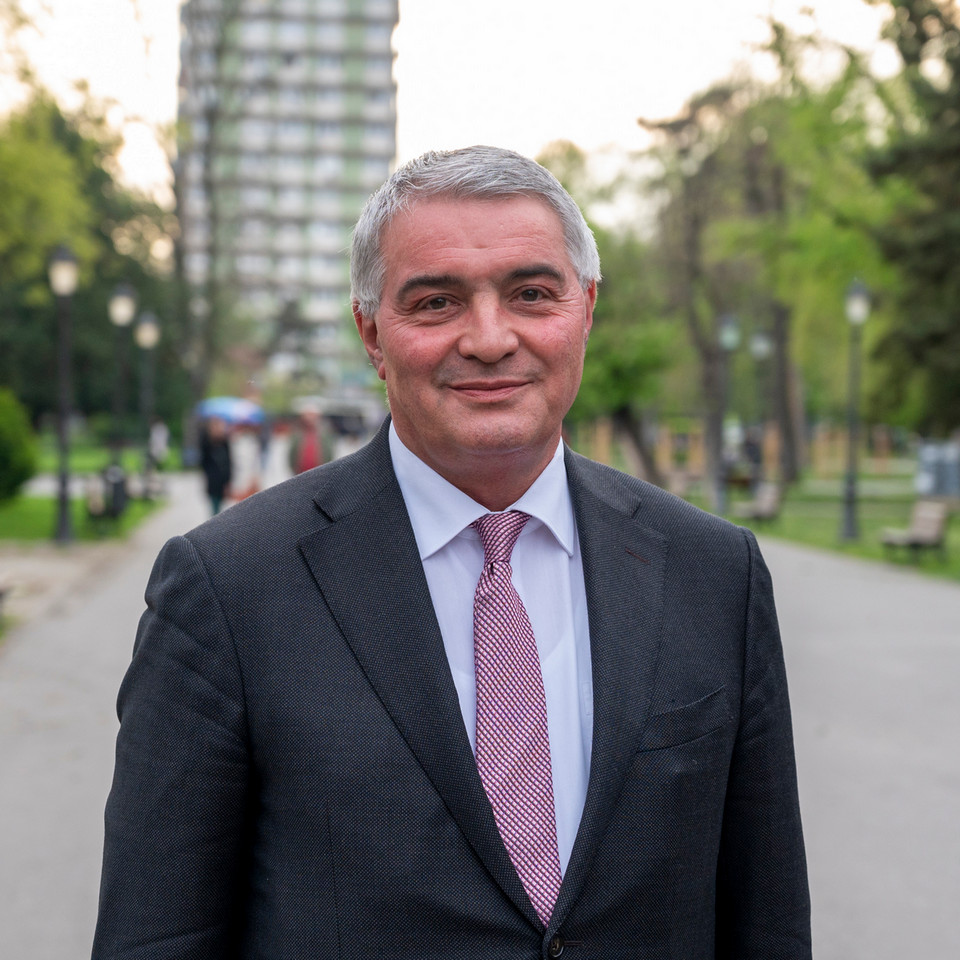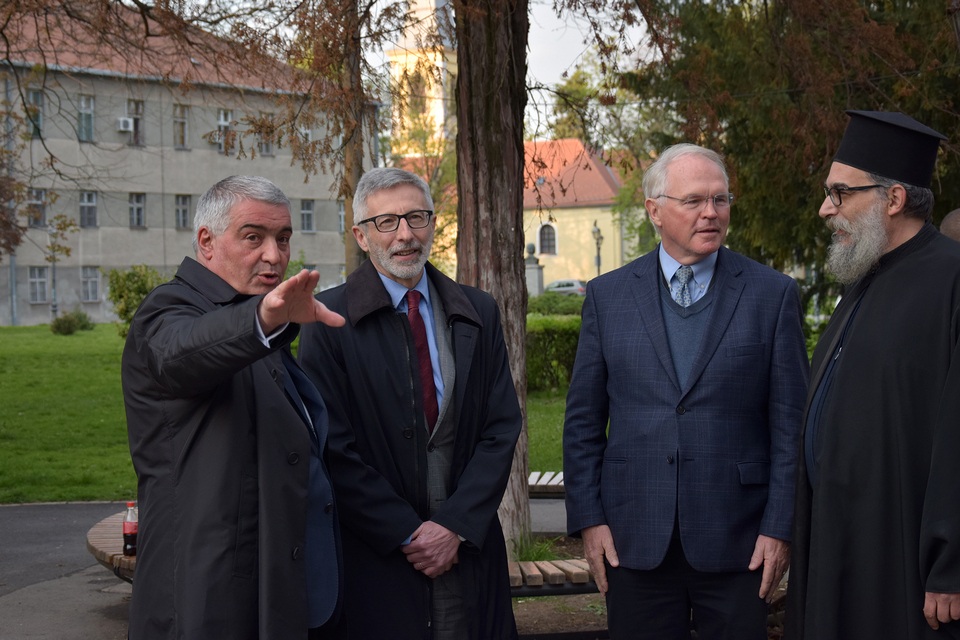Inspired by the younger generations of Serbian Armenians, we want to revive the activities of the Armenian community in Serbia

Armenia plans to establish its first resident diplomatic presence in Belgrade in the near future as a Chancellery of the Embassy of Armenia in Prague, so that’s why we spoke with H.E. Ashot Hovakimian, ambassador of Armenia to Serbia with residence in Czechia.
How would you describe the current state of diplomatic relations between Armenia and Serbia?
Armenia and Serbia are friendly countries and nations with a common past and strong spiritual and cultural interconnections. The current state of relations has to be improved after COVID-19 and to find its previous dynamics and activity: some postponed high-level visits should take place, and more attention should be given to economic relations and cultural and educational exchanges.
Could you tell us more about the Armenian community in Serbia and their role in promoting cultural and economic ties between the two countries?
The Armenian community in Serbia nowadays is rather small, with about a thousand people. It’s quite mixed in the sense of the time when the ancestors of these Armenians came to Serbia. The core of them settled in Serbia from Ottoman Empire at the end of the 19th – the beginning of the 20th century, but the biggest resettlement happened after 1915-1922 due to the Armenian Genocide in Ottoman Empire, where almost 1.5 million Armenians were massacred.
In the Spring of 1922, several Armenian families sheltered in the Mediterranean coastal community of Dört Yol, which survived the Armenian Genocide, appealed to King Alexander I to resettle in Vrnjačka Banja This exceptional case of organized Armenian migration to Serbia was followed by the existence of a successful, vibrant, closely interconnected Armenian community in the city for 100 years.
On April 19, under the auspices of myself and Mayor Boban Đuroviċ, the solemn opening of the exhibition “100 Years of Armenians in Vrnjačka Banja” took place, organized by the newly established Union of Armenians of Vrnjačka Banja and Museum of Culture.
Every year in the last decade of April, in Belgrade, on the occasion of the anniversary of the Armenian Genocide, the wreath-laying ceremony in memoriam to the victims of the Armenian Genocide takes place at the Armenian Khachkar (cross-stone) in Zemun Park, in front of the Church of Saint Archangels Michael and Gabriel. This event unites the descendants of the Genocide survivors with the hundreds of Armenians from Armenia who settled in Serbia after the dissolution of the Soviet Union.
In 90-ies of the last century, a Serbian-Armenian society, which unfortunately ceased to exist, actively promoted the cultural and public relations between our countries. There were and are efforts to create new organisations, also in the regions, and to revive the community’s activity, inspired by the younger generations of Serbian Armenians.
Armenia has achieved respectable rankings on global indices measuring the country’s business climate
What advice would you give to Serbian businesses and investors who are interested in exploring opportunities in Armenia, and how can they best navigate the local business environment?
In 2022 the country’s economy grew by 12.6%. Armenia has achieved respectable rankings on global indices measuring the country’s business climate. Armenia’s investment and trade policy is relatively open; foreign companies are entitled by law to the same treatment as Armenian companies. Armenia’s economic freedom score is 65.1, making its economy the 50th freest in the 2023 Index. Armenia is ranked 28th freest among the 44 countries in the Europe region, and its overall score is above the world average. In 2022, Armenia ranked 63rd out of 180 countries in the Corruption Perception Index (CPI).
The three main drivers in the Armenian economy are the IT sector, manufacturing, and internal demand. Indeed, the Government program aims to improve the manufacturing sectors (metallurgy, chemical industry, mining and jewelry, textile, solar panels, and system), attract foreign direct investments (FDIs), and construction. Of course, it also focuses much on agriculture to guarantee food security.

What steps is Armenia taking to promote its economic interests in Serbia and the wider Balkan region?
Armenia is a country where education and scientific output remain the main asset of the economy, whilst technological advancement and innovation have been set as the main guarantees for sustainable development. We registered rapid success in the developing global tech world. Tech is now the largest foreign investment in Armenia, and many of the world’s most powerful technology companies, including Intel, Microsoft, Google, IBM, Synopsys, and Cisco, all have a physical presence there.
In 2022, for the first time in the history of Armenia, a turnover of more than 1 billion USD was recorded in the field of the high-tech industry. The number of employees in the sector exceeded 40k.
Armenia has already gained successful experience in establishing technological centers like the TUMO Center for Creative Technologies, where young people of all ages can take up innovative and free extracurricular educational programs in the field, and the “Armath” engineering laboratories, which are established in schools and Vocational Training Institutions to promote the development of engineering and robotics skills among students. These two initiatives have become Armenian brands that are now being exported abroad, with international TUMO Centers having been opened in several cities – Paris, Beirut, Moscow, Berlin, Kiev, Zurich, etc. One of the TUMO centers is operating in the Balkan region – in Tirana, the negotiations on the establishment of the centre in Podgorica are going on. TUMO also expressed interest in being present in Serbia and Croatia.
How has the conflict in Nagorno-Karabakh impacted Armenia’s relations with Serbia and the wider international community?
The situation around Ukraine clearly shows the deterioration of the security architecture in Europe. First, it became clear back in 2020, when many remained indifferent to the fact that Azerbaijan unleashed a large-scale war against the people of Nagorno-Karabakh, attempting to solve the conflict by using force. The absence of an equivocal condemnation by the international community of the use of force brought us to the situation the whole world is facing now.
Moreover, since February 2022, as the whole attention was concentrated on the developments around Ukraine, Azerbaijan has been using force frequently. The most blatant example of that was in September last year, when the Azerbaijani armed forces conducted unprovoked aggression against the Republic of Armenia, violating the territorial integrity and occupying around 150 sq km of the sovereign territory of my country. Azerbaijan targeted the eastern and south-eastern regions of Armenia, causing more than 200 deaths, including the civilian population. Killings, extrajudicial executions of prisoners of war, including the torture and humiliating treatment of the bodies of female servicemen, and other barbaric acts were committed and posted on social media by Azerbaijanis.
Another proof of systematic violence and policy of ethnic cleansing masterminded by the Azerbaijani authorities is the blockade of the Lachin Corridor, which left the 120,000 population of Nagorno-Karabakh under siege for 4 months.
What is Armenia’s stance on the ongoing dispute over Kosovo’s status, and how do you think this issue impacts Armenia’s relationship with Serbia?
Armenia is among those countries that have not recognized Kosovo as an independent country. Although the right to self-determination has a special meaning for Armenia, we have always supported Serbia on the Kosovo issue due to the traditional historic relations between our countries and nations. Indeed, the reciprocally attentive approach to our sensitivities regarding the aggression by Azerbaijan against sovereign Armenian territory and the humanitarian crisis in Nagorno Karabakh would be appreciated, which was not always the case. Armenia also contributed to the KFOR mission with 40 soldiers, among them 2 women.
At the same time, Armenia strongly supports the universality of human rights protection, advocating that the Council of Europe’s mechanism shall be available in every corner of our Continent regardless of its status.
Armenia strongly supports the universality of human rights protection
What message would you like to convey to the people of Serbia about Armenia and its people?
I would like to quote the words of great Serbian theologian bishop Nikolaj Velimirović, which were written immediately after the First World War, in 1919, when the future of Armenia was discussed at the Paris Peace Conference:
„It is a moral imperative to you and your country (appeal to „Big Four“ – A.H) as well, to as for all free Christian countries to hurry, yes, to hurry, and to give freedom to Armenians, and thereby to save mankind’s conscience from a shame and from a nightmare. Moreover, freedom ought to be given to the oldest Christian nation, not as a free gift, but as a debt, a debt of Christianity and civilization.
Again I ask: when the heavens and the earth cry out through human conscience for Armenia’s freedom, how dare you bargain about this sacred thing, you Christian powers of the world?
And again, I may say to the weeping children of the Illuminator: when the world awakens from its present moral slumber, you will be not pitied but envied”.